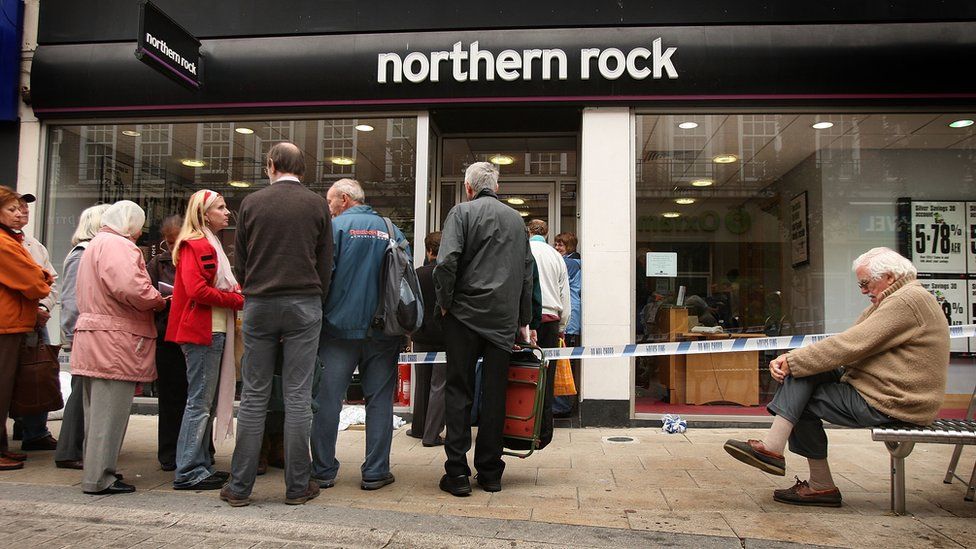Northern Rock: How the crisis improved savers' protection
- Published

The safety net for savings has been strengthened considerably since the queues outside Northern Rock 10 years ago, but savers still face pitfalls.
When customers led the first run on a British bank for more than a century, only the first £31,700 of savings was guaranteed.
Now the first £85,000 per person, per institution is protected under the Financial Services Compensation Scheme.
However, experts are urging savers to keep abreast of the rules.
The nationalisation of Northern Rock meant that no savers with the North East-based bank lost their funds 10 years ago. Many savers were also shareholders, and so they did see their investments hit.
Yet the queues outside Northern Rock were the most visual evidence of a level of panic among cash savers - which persisted during the financial crisis - that they might lose their deposits.
Up to October 2007, and during the time of the run on Northern Rock, the safety net only guaranteed 100% protection of the first £2,000 of savings and 90% of the next £33,000. This was the equivalent of protecting £31,700.
In October that year, it was increased to the whole of the first £35,000, then a year later the government increased protection to £50,000.
A link was then established with European protection, meaning that by the end of June 2009, the first £50,000 or 50,000 euros (whichever was higher) was protected.
At the end of 2010, protection rose to its current level of £85,000, although the strength of sterling meant that during 2016 it was reduced to £75,000.
"Security through the FSCS has increased dramatically in the last few years," said Anna Bowes, of independent savings website Savings Champion.
"Savings are not safe under the bed. They are not secure and there is at least a little bit of interest when you deposit them. Those who shop around can now get some kind of return."
She called on the authorities to ensure that protection remained as secure as the European equivalent following Brexit.
The financial crisis which followed the collapse of Northern Rock prompted a flight to safety by savers.
At the height of the crisis, savers were dividing and moving their funds because of concerns over the future of some banks. Despite government guarantees that savings were safe, many moved their cash to National Savings and Investments (NS&I).
The Treasury-backed institution runs Premium Bonds and offered various other savings products.
Some banks and building societies were unhappy about the perceived extra safety of NS&I, but it did not launch any extra marketing as a result. In July 2009, NS&I suggested that the flight to safety was over.
Current rules
Up to £85,000 per person, per institution is now protected if a bank, building society or credit union goes bust. In other words, if the bank collapses, savers will get any money in these accounts up to £85,000 paid back in compensation.
Joint accounts have a protection level of £170,000.
The Financial Services Compensation Scheme has a protection checker for savers.
Protection above this limit is available for those who have a sudden influx of funds owing to a life event such as a divorce settlement, inheritance or pay-out from a life insurance policy, The "Temporary High Balance" protection covers deposits over £85,000 and up to £1m per institution for up to six months.
This protection is designed to give savers a breathing space to plan what they wish to do with their lump sum.
Importantly, all these rules offer protection per person, per banking licence. Most bank brands will have a separate banking licence but some - for example, Halifax, Birmingham Midshires and Bank of Scotland - share one. Protection is limited to £85,000 in total for anyone with multiple accounts in banks with one licence between them.
Mark Neale, FSCS chief executive, said: "Public trust in the banking system is essential for the economy to function. FSCS is ready to respond if another major failure should occur.
"Consumers should be reassured that in the event of a future failure, FSCS will protect them and ensure that they automatically receive their money back in seven days or fewer."
- Published30 January 2017
- Published11 September 2017
- Published9 August 2017